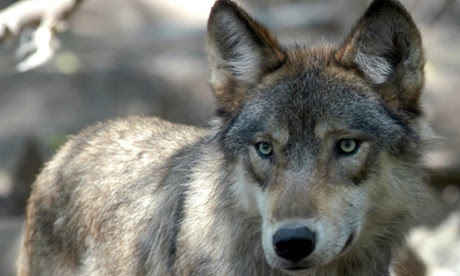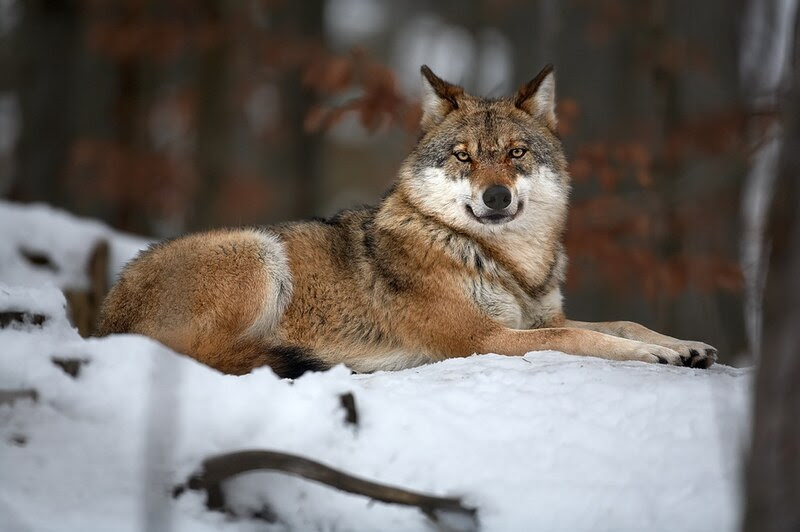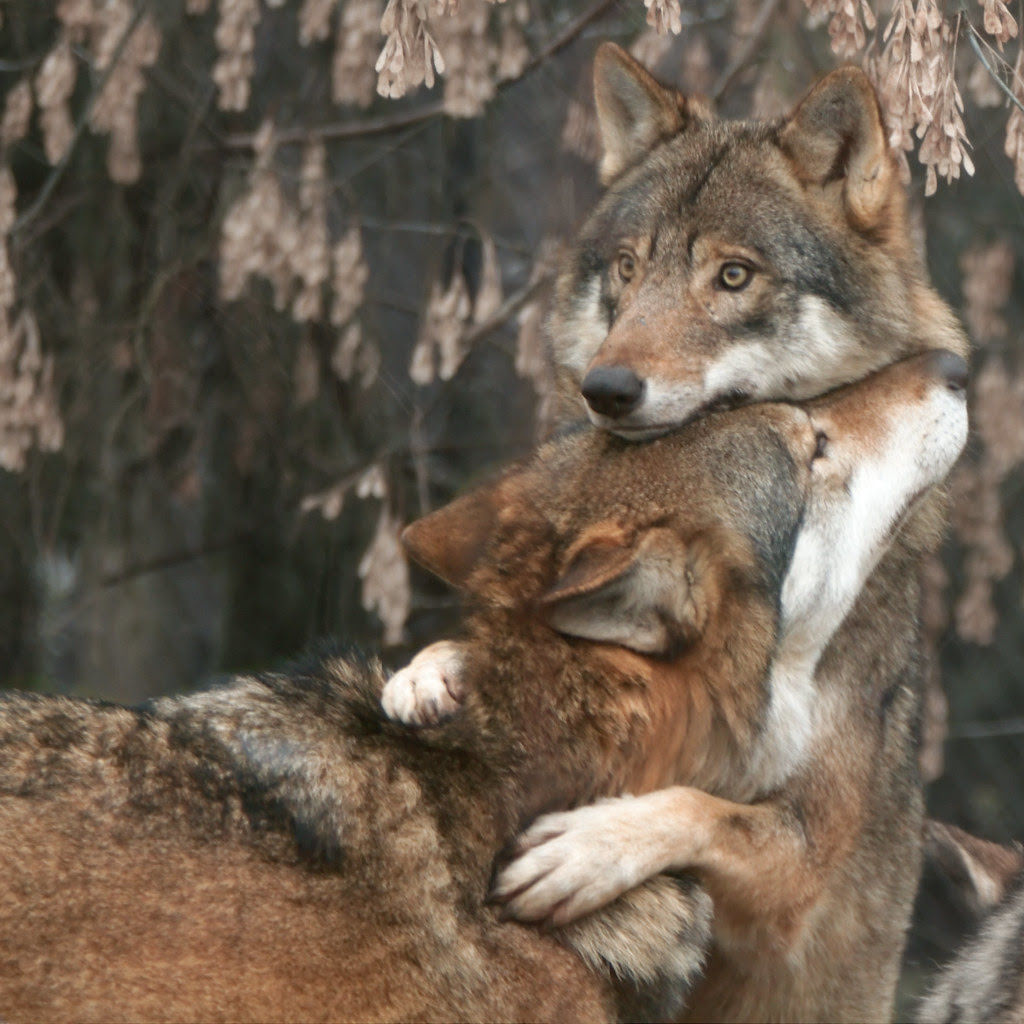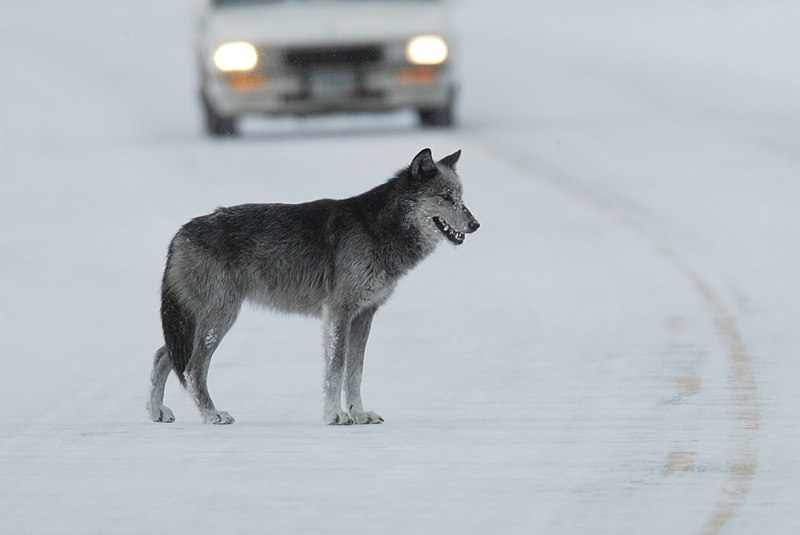.

White female wolf in the Atigun Valley, Alaska. This wolf dens in the riverbank of the Atigun inside the main valley about five miles south of Galbraith Camp. She roams at least twenty miles a day in search of food, from the main valley den into the gorge and then back to the valley proper: photo by Dennis Cowals (1945-) for the Environmental Protection Agency Project DOCUMERICA, August 1973 (US National Archives)
Grey wolf appears in Iowa for first time in 89 years -– and is shot dead
Hunter mistook animal for a coyote and escapes being cited despite wolves being a protected species in the state

Grey Wolf (Canis lupus): photo by Associated Press, via The Guardian, 12 May 2014

DNA testing has confirmed that an animal shot in February in Iowa's
Buchanan County was in fact a wolf, according to the Iowa Department of
Natural Resources. This is the first confirmed grey wolf (Canis lupus) in the US state since 1925.
Experts believe the wolf likely travelled south from Wisconsin or Minnesota, the latter of which has the largest wolf population in the lower 48.
The Iowa wolf, which was a 65-70 pound healthy female, was shot and killed in February of this year by a hunter who mistook it for a coyote. Although wolves remain a protected species in Iowa, the hunter was not cited, because he believed the animal to be a coyote and has cooperated with authorities, including bringing the wolf to them in the first place.
"I was surprised but not that surprised," DNA specialist Vince Evelsizer told the Gazette. "Large animals can cover great distances, and state lines mean nothing to them."
After being nearly exterminated across the continental US, grey wolves have returned to many states in the last two decades, both due to reintroductions and populations migrating from Canada. Grey wolves have been confirmed as far west as California and Oregon and as far east as Michigan.
Experts believe the wolf likely travelled south from Wisconsin or Minnesota, the latter of which has the largest wolf population in the lower 48.
The Iowa wolf, which was a 65-70 pound healthy female, was shot and killed in February of this year by a hunter who mistook it for a coyote. Although wolves remain a protected species in Iowa, the hunter was not cited, because he believed the animal to be a coyote and has cooperated with authorities, including bringing the wolf to them in the first place.
"I was surprised but not that surprised," DNA specialist Vince Evelsizer told the Gazette. "Large animals can cover great distances, and state lines mean nothing to them."
After being nearly exterminated across the continental US, grey wolves have returned to many states in the last two decades, both due to reintroductions and populations migrating from Canada. Grey wolves have been confirmed as far west as California and Oregon and as far east as Michigan.
During the same time wolves have been vindicated by science as key ecological species. As top predators, wolves not only manage prey populations of animals such as deer and elk, but also change their behavior, curbing unhindered grazing. For example, the wolf's return to Yellowstone National Park led to a resurgence in young forest and a subsequent explosion in biodiversity.
But in many states wolves are now actively hunted and trapped. A legislative rider stripped wolves of protection from the Endangered Species Act in 2011, the only animal to ever lose its protection in this way.
As of January this year, hunters and trappers have killed 2,567 grey wolves in the US's lower 48 states since 2011. In all, around 6,000 wolves are thought to inhabit the lower 48 now, up from a nadir of 300 before the grey wolf gained protection in 1974.
Jeremy Hance, Guardian Environmental Network, 12 May 2014

Adara (Canis lupus), alpha female of the high country wolves. Grizzly and Wolf Discovery Center, West Yellowstone, Montana: photo by Nomadic Lass, 18 May 2011

McKinley (Canis lupus), Grizzly and Wolf Discovery Center, West Yellowstone, Montana: photo by Nomadic Lass, 18 May 2011

Grey Wolf (Canis lupus), seen by the side of Going-to-the-Sun Road, Glacier National Park: photo by GlacierNPS, 10 April 2012

Grey Wolf (Canis lupus), seen by the side of Going-to-the-Sun Road, Glacier National Park: photo by GlacierNPS, 10 April 2012
An endangered Grey Wolf (Canis lupus) peers out from a snow-covered shelter: photo by Tracy Brooks, 2002 (U.S. Fish and Wildlife Service)

Arctic Wolf (Canis lupus family canidae or plains tundra or timber wolf): photographer unknown, 25 February 2013 (U.S. Fish and Wildlife Service)
Gray wolf (Canis lupus) lying in grass: photo by John and Karen Hollingsworth, 2002 (U.S. Fish and Wildlife Service)

Gray wolf (Canis lupus), Nationalpark Bayerischer Wald, Deutschland: photo by Martin Mecnarowski, November 2008
Canis lupus at Bialowieza: photo by Przykuta, 2007
Black and grey female wolf (Canis lupus), in road near Lamar River bridge: photo by Jim Peaco, December 2003 (U.S. National Park Service)

Grey Wolf puppy (Canis lupus), dreaming, Alpenzoo, Innsbruck: photo by btristan, 13 July 2007

Grey Wolves (Canis lupus), Rotterdam Zoo: photo by Sander van der Wel, 15 January 2010





.
ReplyDeleteh ow
o minously
w ired minds
l augh
.
i have always adored these beautiful and unique beings... their group life has some amazing lessons for us to learn from... and unfortunately they are misunderstood!
thanks you Tom!
Tom, this is amazing. Your photo archive bristles with cosmos... A great post, and please forgive me if it sent me to my indices to find a wolf poem I would hope somehow appropriate...)
ReplyDelete(from Wolf Circle)
2
I sat among a pack of wolves
until my teeth chattered
It was confession time among the furry and
slitted yellow-eyed
silver-maned and black-tip tailed
I tried to speak from my own wolfish heart for the
first time in years
I stood in their circle the males and
females waiting for my words
My heart fell out of me there in the dark
it was a small firefly after all that
tried to dart away flickering on and
off like a shorted night-light
I am so flawed and broken I don’t know where to start
The wolves all looked at me warily
That wasn’t the place to start
These were all old wolves
You couldn’t fool them
I come to you naked and afraid I said
that got more of their attention
I would rather be anywhere but here I said
They began to drift themselves to some
faraway mesas they’d known perhaps as pups
But their eyes shot back like brandy in a
shot-glass gulped in desperate haste
There was no more time to shilly-shally
not among a pack of hungry wolves
and wolves are always hungry
Everything I could think of seemed so lame
not up to the level of this moonlight and its
attentive circle
its lunar seminarians waiting for the ignited
transcendent moment
They would devour me I thought if I
didn’t manage to deliver what didn’t even feel like
mine to deliver
A word so hot it would sizzle in this moonlight
a word so human and so wolflike their
white neck hairs would bristle at its
pronouncement
O God help me
leave my face out of it
and how good I want it to look
how perfectly presentable
Let Your Face alone shine forth
There’s an imprint on my soul I’d leave in the
dust among these crags if I could that would be
as real as these four-footed print-makers and moon-
howlers who never
seem to tire of their sorrows and never seem to
tire of the long silhouettes against the moon of each other’s
haunted songs
_______________
(from Psalms for the Brokenhearted, 2003)
Wolves have a poor reputation. They are neither adorable nor cuddly. Movie stars don't pine for photo ops with adult Grey Wolves in the wild.
ReplyDeleteIndeed..."they are misunderstood".
They are independent. They stand their ground.
They teach us that "fierce" is an adjective that can be applied to skill at survival.
But they were hunted to the brink of extinction, in this country. And when one of them is illegally murdered now, the benefit of the doubt goes to the two-footed beast.
The photos show the power and intensity of their gaze. In photo # 3, the eyes look down, but even while looking down, they look up.
Eye contact with a wolf in the wild might provide another sort of lesson.
"But their eyes shot back..."
(Full moon tonight.)
I was thinking not of #3 but of the stealthy, lowering eyes in #4.
ReplyDeleteIn #2 the direct frontal gaze... which doesn't have to do with stealth. Just attention.
yes, Tom... that was the reason for my h o w l...
ReplyDeletewhy do people tend to imprison their minds in some hackneyed frameworks?!
my daughter's opinion is drastically different: she believes that we shouldn't kill a persian leopard (another endangered beauty), to save her in case she happened to be attacked by one... as her species is not endangered!!!!
wolves have piercing looks... yes!
even a teetotal crow can appreciate deeply the cutting sensation of this beautiful image by Daniel:
"eyes shot back like brandy in a
shot-glass gulped in desperate haste"
i have always felt a sadness in their eyes too... Daniel's words are very expressive:
"moon-howlers who never
seem to tire of their sorrows"
Tom, i really liked your take on their fierceness...
and... the way you put up the photos always tells a great story or guides our mind to a question or resolution... in the last photo, i read a question in the wolf's eyes:
what will become of us?
If it had been a coyote it would not have made the news. Even. But, someone will contend, the coyotes are a problem. You see, they . . .
ReplyDeleteNo. We are the problem. How is it that the wolves and the coyotes both know this, and we don't?
Possibly because they possess the innate ability to both see deeply into and imagine themselves (in some timeless "dreaming" way we probably can't even imagine) far beyond things, especially things of the immediate moment -- a skill "we" appear to lack as a species, though "we" are purported to have acquired something along those lines when a freak bit of chimpanzee DNA figured out how to use objects as weaponmaking toolkits.
ReplyDeleteUltimately, the human population of the earth must be brought back into balance.
ReplyDeleteThis may occur through environmental disasters brought on by mankind's own intemperance. Or by opportunistic viruses and bacteria brought on by crowding and intemperate use of vaccines etc.
Either way, it must happen. Mankind is destroying other species and fouling the planet.
I was never much of a dog man in my earlier life, but I've come to love dogs as much as I do cats.
Down the hill, the Albany high school has set aside a grassy dog run on the northeast side of the playing areas, where you can see as many as 20 breeds at a time gamboling about together, in harmony.
Wolves are predators. They were here before us, and very likely will be here when we're gone, or have become "endangered" ourselves.
I sympathize with ranchers. A dead sheep or calf is a grisly sight. But the wolves were here before us, and it's their land more than it is ours.
I have no desire to meet a wolf in the wild. Or a bear. But I want them there, and I want wildness. We need wildness. The rapidly disappearing wilderness is . . . well, we all know this argument, I don't have to repeat it.
It was recently reported that an Oregon wolf--wolf number OR-7 or something--was spotted in the northwest corner of California, the first such sighting in a long while.
They've tried to domesticate wolves. In Eastern Russia, they have a cross-breeding program going. They've tried raising pure-bred black wolves in domestic circumstances, but these critters won't behave. They're impulsive, and may become aggressive.
Good for them!
Curtis,
ReplyDeleteWell, if everything that was here before us could pull the seniority card, we'd become instant lunch. And good riddance, echoed the booming Ironist in the Sky.
I've made my wee effort to spit into the wind of encroaching mass species extinction by offering sympathetic support, over the years, to any number of unpopular species.
E.g.:
Sweet Thing: Rat
With such campaigns I liked to think I was doing my bit for the undervalued critters.
But then, when I did this one, the inexplicable explosion of hits briefly caused an outbreak of that condition of Blogger Vertigo which we all know and dread, when for a terrible moment everything in the world seems exactly the opposite of what it actually is.
I learned, first, that a certain college football player, then at his apogee of stardom, was nicknamed Honey Badger. And a billion redneck morons were a-searchin' him.
Next I learned -- even more revolting -- that a hideously cute-ified bit of video had notched 50 million hits at the expense of this particular animal, which, over the course of time, has never been guilty of any crime beyond the putative offense of being what it in fact is.
All that insanity was really racking up the Google Idiot count. Terrific. Here I was, the Jane Goodall of the Honey Badger, getting the attention of a large mass of what turned out to be absolutely the worst species available.
For, yes, it turns out to be true.
50 million idiots can be made to flop on the deck in front of the flatscreen like harpooned tuna by a single Animalsploitation video.
That was daunting. I headed straightway back to the several huggable furry endangered species, of which there remain so many -- more every day! -- one pretty much can't miss. Even if one's motive is to be missed.
Firecat in Nature Theatre